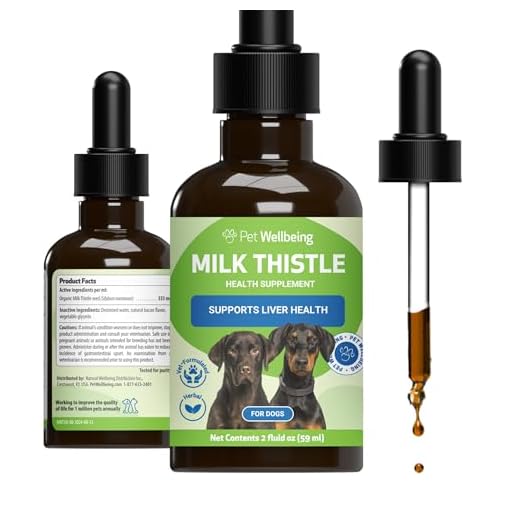




Recognising the signs of hepatic distress in your pet is paramount. A sudden change in behaviour, appetite loss, or unusual lethargy can indicate serious underlying issues. If you notice these symptoms, consult your veterinarian immediately for a thorough examination and diagnosis.
Several factors can lead to compromised organ function in canines. Toxic substances, such as certain plants, human medications, or even spoiled food, can wreak havoc on a pet’s system. Owners must remain vigilant about what their companions consume, as seemingly harmless items can prove detrimental.
Infections, whether viral or bacterial, pose another significant risk. Conditions like leptospirosis can lead to severe complications if not addressed promptly. Early intervention is critical in managing these health threats effectively.
Genetic predispositions also play a role. Certain breeds may be more susceptible to hepatic issues, making it essential for owners to be aware of their pet’s lineage and medical history. Regular check-ups can help in monitoring any potential problems before they escalate.
Lastly, age-related changes can contribute to organ dysfunction. Older pets often experience a decline in overall health, making them more vulnerable. Maintaining a balanced diet and regular exercise can support their well-being and longevity.
Identifying Risks for Canine Hepatic Complications
Monitoring your pet’s diet is paramount. Certain foods, such as chocolate, onions, and grapes, are notorious for causing serious harm to a canine’s system, potentially leading to severe hepatic issues.
Exposure to specific toxins, both in household products and in the environment, can be detrimental. For instance, some plants like azaleas and mushrooms are highly toxic and can trigger acute reactions. Always ensure your furry friend doesn’t have access to these hazards.
Genetic predispositions play a significant role in the health of your canine companion. Breeds like Doberman Pinschers and Yorkshire Terriers are known to be more susceptible to hepatic disorders. Being aware of breed-specific risks can guide you in preventive care.
Infections caused by viruses or bacteria can impact a dog’s health dramatically. Conditions such as leptospirosis can severely affect the organ’s function. Regular vaccinations are advisable to prevent such infectious threats.
Chronic diseases, particularly diabetes or obesity, can lead to stress on the organ, resulting in long-term damage. Keeping your pet at a healthy weight can mitigate these risks significantly.
| Risk Factor | Impact |
|---|---|
| Dietary Hazards | Can lead to toxic reactions and organ stress |
| Toxins | Environmental and household toxins can cause acute damage |
| Genetic Factors | Some breeds are more prone to hepatic complications |
| Infections | Can lead to severe organ impairment |
| Chronic Conditions | Weight and metabolic issues can strain organ function |
Regular veterinary check-ups are essential. Early detection of any abnormalities can make a significant difference in treatment outcomes. Keep an eye out for unusual symptoms such as jaundice, vomiting, or changes in behaviour. The sooner you act, the better the chances of recovery for your four-legged friend.
Understanding Hepatic Encephalopathy in Dogs
Recognising the signs of hepatic encephalopathy is vital for timely intervention. Symptoms may include disorientation, lethargy, or unusual behaviour. If you notice your pet acting strangely, consult a veterinarian immediately.
Symptoms to Watch For
Common indicators of this condition include confusion, loss of coordination, and altered sleep patterns. Some pets may exhibit compulsive behaviours or changes in their appetite. Pay close attention to any sudden shifts in personality, as these can signal significant issues related to brain function.
Management and Treatment
Managing hepatic encephalopathy involves dietary adjustments, such as low-protein diets to reduce ammonia production. Medications like lactulose can help decrease ammonia levels in the bloodstream. Regular veterinary check-ups are crucial for monitoring and adjusting treatment plans as needed. Early detection and consistent care can improve your companion’s quality of life significantly.
Identifying Symptoms of Liver Dysfunction
Observe your pet for changes in behaviour and health. Signs indicating potential hepatic issues include excessive thirst and urination. If your furry friend seems more tired than usual or reluctant to engage in playtime, it’s time to investigate further. A sudden decline in appetite or noticeable weight loss can also be alarming indicators.
Physical Signs to Watch For
Look for a slight yellowing of the skin or eyes, known as jaundice, which may signal an underlying problem. Additionally, check for unusual droppings; pale or clay-coloured stools can suggest digestive disturbances. If your companion has a distended abdomen, it could imply fluid accumulation, warranting immediate veterinary attention.
Behavioural Changes
Monitor for disorientation or confusion, as these may point to neurological effects stemming from organ distress. If your pet exhibits sudden aggression or anxiety, this could be another red flag. Regular check-ups are essential, and if you notice any of these symptoms, consult your veterinarian for an accurate diagnosis and timely intervention.
Common Toxins That Affect Canine Liver Health
Be vigilant about common substances that can jeopardise your furry friend’s health. Certain plants and household items are notorious for their toxic effects. For instance, the ingestion of grapes and raisins can lead to acute disturbances in hepatic function, even in small amounts. If you’re a fan of these snacks, keep them well out of reach.
Another serious threat comes from xylitol, a sugar substitute found in many sugar-free products. It can result in a rapid decline in your pet’s wellbeing, affecting more than just their metabolic processes. Always check ingredient labels before sharing any human food with your companion.
While gardening, be cautious of specific plants like foxglove, which can be deadly. It’s best to research any new plant before introducing it to your home or yard. Essential oils, too, should not be overlooked; some varieties can be harmful if ingested or even inhaled by your canine buddy.
Medications meant for humans can have dire consequences if ingested by your pet. Acetaminophen, for example, is extremely toxic. Never administer human medicines unless explicitly instructed by a veterinarian.
Lastly, be aware of certain moulds that can grow on spoiled food. Aflatoxins from these moulds are highly toxic and can lead to severe complications. Always monitor your pet’s diet to avoid any mishaps.
Impact of Breed and Genetics on Liver Disease
Certain breeds exhibit a higher predisposition to hepatic disorders. Breeds like Labrador Retrievers, Doberman Pinschers, and Cocker Spaniels are more frequently diagnosed with conditions affecting the organ. Genetic factors play a significant role in the likelihood of developing these ailments, as inherited traits can influence liver function and overall health.
Inherited Conditions
Some breeds are prone to specific hereditary issues, such as copper storage disease in Bedlington Terriers and Labrador Retrievers. This condition leads to excessive accumulation of copper, causing serious impairment. Regular screenings are advisable for these breeds to detect any early signs of dysfunction.
Environmental Influence
While genetics are crucial, the environment also impacts a canine’s liver health. Dogs with a genetic predisposition may be more susceptible to toxins or dietary factors. It’s essential to monitor their exposure to harmful substances and ensure a balanced diet. A holistic approach, including regular vet check-ups and a healthy lifestyle, can significantly improve outcomes for breeds at risk. For example, just as a good quality best back scrubber for sensitive skin can help maintain hygiene, proper care can enhance your pet’s well-being.
Dietary Factors Leading to Liver Dysfunction
Feed your canine companion with high-quality, balanced nutrition to promote optimal health. Poor dietary choices can significantly impact hepatic function, leading to various complications.
- High Fat Diets: Excessive fat can strain the organ, particularly in breeds predisposed to metabolic disorders. Limit fatty treats and consider low-fat options.
- Low-Quality Ingredients: Foods with fillers and artificial additives can cause inflammation. Opt for brands that use whole, natural ingredients.
- Unregulated Supplements: Some supplements can be harmful. Always consult with a vet before introducing new products into your pet’s diet.
- Protein Levels: Imbalance in protein can be detrimental. Ensure a proper ratio based on your pet’s needs; consult with a veterinarian to determine the right amount.
- Salt Intake: Excessive salt can lead to fluid retention and stress on the organ. Choose low-sodium options for your furry friend.
- Home-Cooked Meals: While well-intentioned, preparing meals without proper guidance can result in nutritional imbalances. Follow vetted recipes or consult a veterinary nutritionist.
When adjusting your pet’s diet, consider specific health conditions. If you’re wondering whether a kidney diet dog food can help with weight gain, it’s crucial to consult your vet. They can provide tailored advice based on your pet’s unique requirements. Regular monitoring and adjustments can prevent future complications.
Preventative Measures for Liver Health in Dogs
Regular veterinary check-ups are key to maintaining your canine companion’s well-being. Schedule annual exams and ensure routine blood tests are performed to monitor organ function.
- Diet Management: Provide a balanced diet tailored to your pet’s specific needs. Avoid high-fat foods and limit treats that could lead to obesity.
- Hydration: Always have fresh water available. Dehydration can strain bodily organs, including the ones responsible for detoxification.
- Weight Control: Maintain a healthy weight through portion control and regular exercise. Obesity can increase the risk of various health issues.
- Exercise: Engage your furry friend in daily physical activities. Regular playtime promotes overall health and aids in digestion.
- Avoid Toxins: Be vigilant about household items and plants that are toxic to pets. Common substances like certain medications, chocolate, and some human foods should be stored securely.
Monitoring for early signs of discomfort can be beneficial. Changes in appetite, energy levels, or behaviour may indicate underlying issues.
- Supplements: Consult your vet about liver-supportive supplements such as milk thistle or SAMe. These can help maintain optimal function.
- Vaccinations: Keep your pet’s vaccinations up to date to prevent diseases that could affect organ health.
- Limit Exposure: Reduce exposure to chemicals, pesticides, and other pollutants that could harm internal organs.
By integrating these practices into your routine, you can enhance your pet’s long-term health and well-being. Regular attention to their lifestyle choices makes a significant difference.
FAQ:
What are the main causes of liver failure in dogs?
Liver failure in dogs can be attributed to various factors. Common causes include infections, toxins, certain medications, and underlying health conditions such as liver shunts or cancer. Additionally, poor diet and obesity can contribute to liver problems. Early detection and treatment are crucial to managing these conditions.
How can I tell if my dog is suffering from liver failure?
Signs of liver failure in dogs may include jaundice (yellowing of the skin and eyes), vomiting, excessive thirst, changes in appetite, and lethargy. You might also notice behavioural changes, such as increased restlessness or difficulty in coordination. If you observe these symptoms, it’s important to consult a veterinarian for a proper diagnosis.
Are certain dog breeds more prone to liver failure?
Yes, some dog breeds are more susceptible to liver issues than others. Breeds like Doberman Pinschers, Labrador Retrievers, and West Highland White Terriers are known to have higher risks of liver diseases. Genetic predisposition can play a significant role, so it’s advisable for owners of these breeds to be vigilant about their dogs’ health and regular veterinary check-ups.
What role does diet play in preventing liver failure in dogs?
A balanced diet is crucial for maintaining liver health in dogs. Feeding high-quality dog food that meets their nutritional needs can help prevent obesity and related liver issues. Avoiding fatty foods, toxins, and human food that can be harmful is also important. Regular consultations with a veterinarian can help ensure that your dog’s diet supports their overall health.
What treatments are available for dogs diagnosed with liver failure?
Treatment options for dogs with liver failure depend on the underlying cause. In some cases, supportive care such as medications to manage symptoms, special diets, and hydration therapy may be necessary. If a specific toxin or infection is identified, targeted treatments will be initiated. Regular veterinary follow-ups are essential to monitor the dog’s condition and adjust treatment plans as needed.









